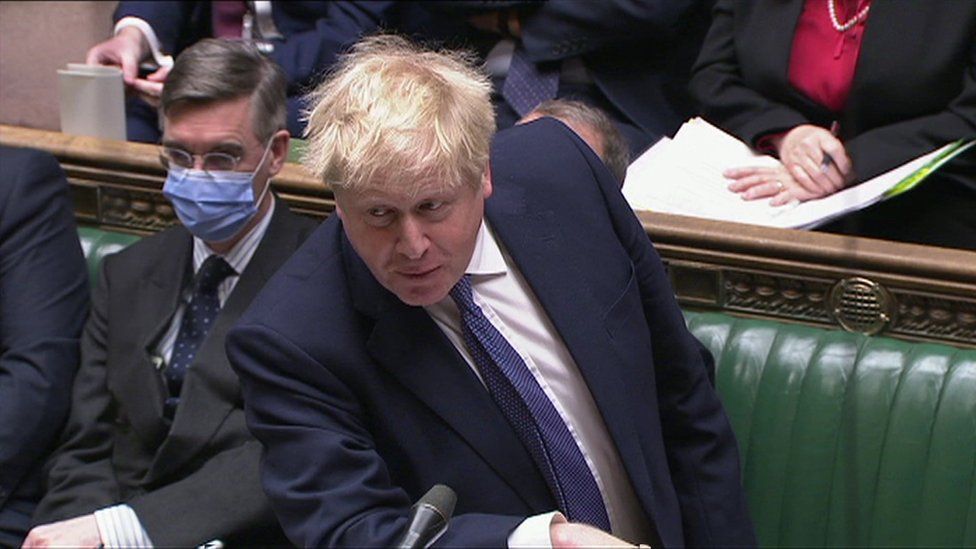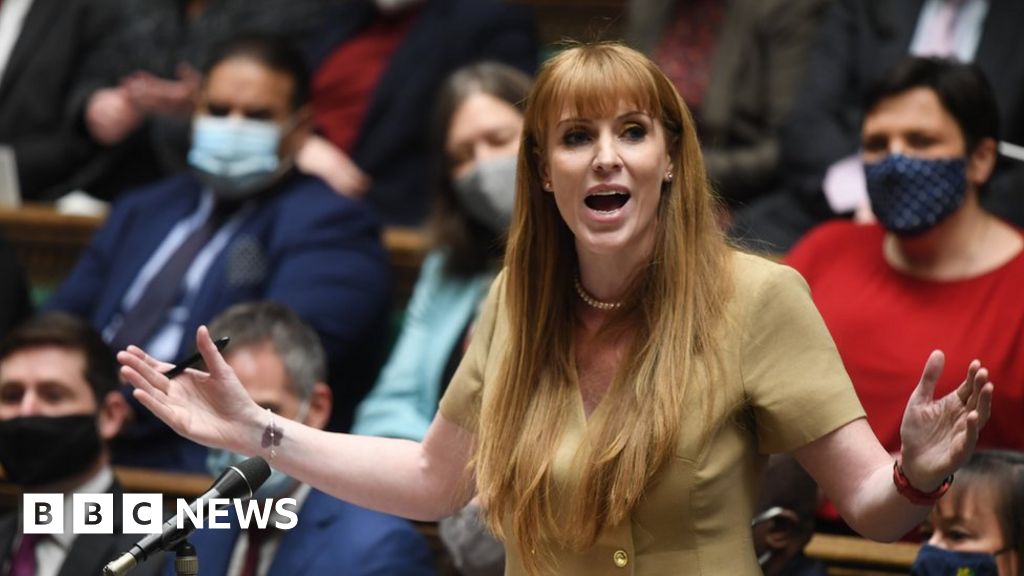This video can not be played
To play this video you need to enable JavaScript in your browser.
Labour has stepped up its call for the 5% VAT rate on energy bills to be scrapped, demanding “serious solutions” for the rising cost of living.
Speaking at Prime Minister’s Questions, the party’s deputy leader Angela Rayner said working families were “picking up the tab” for Boris Johnson’s “incompetence” over the issue.
But the PM insisted the government was providing a number of schemes to help.
A spike in wholesale gas prices has led to soaring energy bills in the UK.
A total of 27 energy companies have also gone bust as the energy price cap – limiting how much consumers can be charged – saw some businesses forced to sell energy for less than they bought it for.
But there are fears an expected rise in the cap, due in April, could see households hit with even higher bills.
Labour has been calling for the government to slash the 5% VAT rate on energy bills to zero since October, with shadow chancellor Rachel Reeves calling it a “simple” and “immediate” measure to help people deal with costs over the winter.
A group of 20 Conservative MPs and peers – including five ex-ministers – joined the call last week, writing to Mr Johnson to urge him to cut VAT, as well as going further by suspending environmental levies which fund renewable energy schemes.
And writing in the Sun back in 2016, Mr Johnson himself advocated scrapping VAT on energy bills, saying it would be a benefit of Brexit.
Backers of the plan said VAT receipts had come in more than £3bn higher than forecast because of rising prices, giving the government extra funds to cover the cost.
But a Treasury source has told the BBC that rising bills overall mean consumers are spending less elsewhere on products with higher VAT, so the overall income to the government has remained flat.

Fact-checking PM’s claims

At Prime Minister’s Questions, Boris Johnson said – twice – that the Warm Home Discount Scheme was “worth £140 a week”.
That’s wrong – it’s worth £140 for the whole of the winter.
It’s a one-off discount on the electricity bills between October and March of people on low incomes.
Labour’s deputy leader Angela Rayner said: “In October, the prime minister said that fears about inflation were unfounded.”
Mr Johnson replied: “Of course, I said no such thing”.
But in October, he told Sky News: “People have been worrying about inflation for a very long time… those fears have been unfounded.”
And at PMQs, he said that “everybody on the living wage has seen another £1,000 in their income”.
The living wage is going up in April from £8.91 an hour to £9.50, which will be £1,000 for somebody working full-time.
Clearly, people working fewer hours will receive less. Also, these are figures before taxes and benefits are taken into account.
Income tax, National Insurance and the loss of Universal Credit as earnings increase all mean that even a full-time worker is likely to end up with significantly less than £1,000.

Standing in for Labour leader Sir Keir Starmer – who has tested positive for Covid – Ms Rayner said “working people across the country are facing rising bills and ballooning prices”, due to a mixture of inflation, rising energy costs and an incoming tax rise to pay for the NHS and social care.
She added: “The prime minister has made political choices that have led us into this place.”
The deputy leader claimed the government had “failed to invest in long term energy security” and “let the energy market run out of control”, adding: “Can’t the prime minister see what is happening?
“Yet again working families are picking up tab for his incompetence.”
And having quoted his article in the Sun promising the VAT cut, Ms Rayner said “any decent government would find a way to help British families” and asking him to “finally stand up to his chancellor” to secure the move.

But Mr Johnson said a number of government initiatives – including the warm homes discount, winter fuel payments and cold weather payments – were supporting people, especially those on low incomes.
He also accused Labour of “bare-faced cheek” for calling for the VAT cut, as the party campaigned to stay in the EU – when it would not have been an option.
“Everybody knows full well it would be absolutely impossible if they were to do what Labour would do and go back into the EU [and] remain aligned with the EU single market,” said the PM.
“That is the objective of the Labour Party. They can’t be trusted on Brexit and they can’t be trusted with the economy.”

What are the options to tackle the energy crisis?

Abolishing VAT of 5% on energy bills would be quick and easy, but is considered a blunt instrument, as it would provide support to well-off customers who don’t need it.
And for those that do need it, 5% of a possible £700 price rise is pretty small.
The government could temporarily suspend the additional levies on bills that fund green policies.
But that would be a tricky sell in some quarters, after the UK hosted a major global climate summit, and these levies are designed to reduce dependence on volatile fossil fuels.
One other option is to extend and expand the Warm Homes Discount. Currently, customers in receipt of certain benefits can apply for a one-off payment of £140.
And another option – suggested by the industry – would be to subsidise the energy companies themselves, by establishing a fund or facility which would allow them to draw down government cash when wholesale prices were very high and then pay it back when prices dipped again.

The SNP’s leader in Westminster, Ian Blackford, also attacked the prime minister over the rising cost of living, saying: “We’ve had the year of Tory sleaze, but now we’ve got the year of Tory squeeze for family budgets”.
He quoted research from the Resolution Foundation, saying on average families will be £1,200 worse off from April “as a result of Tory cuts, tax hikes and soaring energy bills”.
Mr Blackford asked the PM to “commit to an emergency financial package” to help the worst off.
But Mr Johnson said the government was “helping families up and down the country”, pointing to changes to the Universal Credit taper and increases to the living wage.
He added: “You’ve now got more people in work than there were before the pandemic began.
“That is because of the balanced and proportionate approach that we’ve been taking.”
